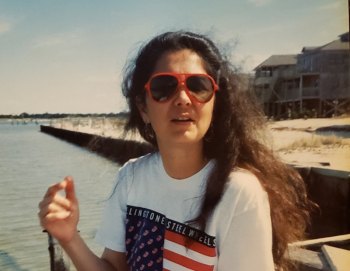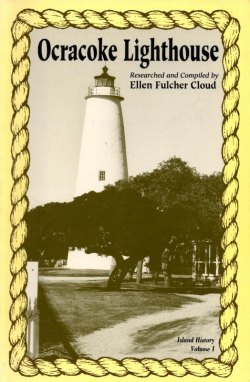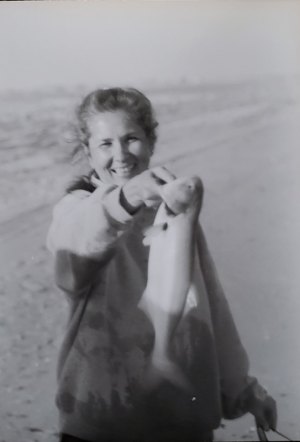Dingbatters
by Paulette Chitwood c. 1993
We were sitting in her office at the back of the house and heard the front door when Diedre came in. Having seen my strange truck parked in front of her mother’s house, she yelled, “Who’s back there with you, Mama?” Across the desk from me, Ellen Marie’s mischievous reply, eyes twinkling in laughter as she spoke, was quick, “Just some no-account dingbatter!” Well, I must tell you I was a bit shocked. A student, so to speak, of the Ocracoker vernacular for about three years at that point, I had never heard that word. I guess my friend, Ocracoker Ellen Marie Cloud, figured it was time, and as only she could, chose a ripe moment when I was totally off guard to educate me.
In three years on Ocracoke, I had taken great care with my answer when people asked if I was “from Ocracoke.” I chose my words carefully. “I live here. I am a local, but I am most certainly not a Native.” Tourists were always asking questions about the island, especially on the ferry, and I didn’t want some O’cocker on the boat to overhear me talking to that tourist and thinking I was making out like I was a Native. In the mountains of Virginia where I’m originally from that would be called hanging my hat above my head, way above my head if you get my meaning. Eventually, however, it was pointed out to me that the Natives did, indeed, call themselves “locals” rather than Natives, so my reply got amended to, “I live here now, but I wasn’t born here.” Figuring that was as clear as I could get, I scratched through “Natives” and wrote in “locals” just below “the tourist” and puck and buck and momick’ed in my Ocracoker dictionary.
That night in her office, Ellen Marie looked at my open mouth and the pained puzzlement on my face, and she laughed even harder. “Don’t worry,” she said, “You’re really a transplant now.” Transplant? What’s a transplant? Three years and I haven’t heard either one of these words. Somehow “transplant” felt better but I wasn’t at all sure why. What was the dingbatter word I had just been accused of being?

Dingbatter. Ding. Batter. The word would not roll easily over my tongue. Rather, it seemed to declare itself. Dingbatter! I liked it and over the next two years the word became a part of the way I looked at things.
Sam Jones was a dingbatter, for heaven’s sake. He married a local girl, but before that he was a dingbatter from Little Washington, North Carolina. I was a dingbatter before I granduated to a transplant. People I knew that had been here for twenty and thirty years-they, too, had been dingbatters. And over time, the sound of the word gave way to its meaning .. an outsider. Those outsiders who chose to live their life on Ocracoke Island, if accepted, became transplants.
And then the meaning gave way to the faces of the dingbatters, or transplants, I knew. And the faces became stories, as they always seem to do with me. Every day as I walked to the post office or shopped at the Variety Store or the Community Store, I would look around at my fellow dingbatters as I now preferred to call us, and I would think about our stories. We all knew something about each other and how we got here. The question “How did you get here?” had yielded numerous fascinating stories.
And here my mind worked through the stories one by one, over and over again until the stories gave way to the idea of choices. It seemed that all the stories centered around a choice, usually made in extreme circumstances. We had all made a choice to be here. And more importantly, perhaps, life on Ocracoke Island required us to continually make that choice over and over again. By that I mean that life here was not easy, and when it got tough, without family or support, it would be very easy to run back to a job in the city. But again and again, we chose this island and its unique way of life.
Plainly put, it is one thing to be born into a hard, crusty individualist way of life. It is quite another to choose it.
Editor's note: This essay is a blast from the past! Paulette and I worked together at the Village Craftsmen in 1993, when I was a brand new dingbatter/transplant wannabe. She was around when I met Capt. Rob and came to our wedding and met our first baby when he was born in 1995, but I couldn't quite remember when she moved away. I asked Paulette to remind me how she got to Ocracoke and when she left. Her reply:
Ok, so I set out for Ocracoke Island February of 1990. The previous summer I had done a "walkabout" of sorts, two weeks of pilgrimage from Atlanta where I had lived for twelve years to Virginia and Richmond visiting family and old friends along the way. After Richmond, wanderlust took over and I headed down the Outer Banks knowing absolutely nothing about where I was headed. After a couple of nights at C.W. Pugh's b&b in Wanchese I needed to move on, impatient. It was like I was on a scavenger hunt picking up clues from one place to another and I needed the next clue. Eventually, I found myself sitting at the rest stop at Whalebone Junction knowing I was about to jump off a cliff if I pulled out onto Highway 12 to Hatteras and Ocracoke. Three times in my life I've felt that excitement from something pushing me into the unknown. I never made it to Ocracoke, can you believe it? Ran out of time and had to turn back as you see time is another dimension out there, but the "on" switch for a homing device had been turned on. I got myself back to Atlanta, immediately began making phone calls to Ocracoke realtors looking for a three month rental ~ in winter. I had never been there but I was determined to go. In winter. Quit my job, packed up the car and left. That was February 1990.

I honestly can't remember the year I left but I think it was around 1996. I may be wrong. Leaving was always emotional for me, even a short trip. After moving there, when traveling to Atlanta for work I would fluff up the bed in the back of my Toyota pickup (you are always prepared to miss a ferry, right?), drive onto the early Swan Quarter ferry, set the parking brake, climb in the back and pull the covers over my head so I couldn't watch the island fall away behind me.
BTW my friendship with Ellen Marie came about as I had done a lot of genealogy, restored old graveyards, written and published (for someone else), and I helped her put her book on the Ocracoke Lighthouse together.
Nowadays, Paulette lives in the Smith Mountain Lake area of Virginia in an old, drafty farmhouse on 125 acres. She's mostly retired, but works part-time at a nursery and has a reiki practice at a local spa. She gardens and watches the bears, turkeys, and deer, and plots against the groundhog.
Ellen Marie passed away in 2016. Her obituary is here.




